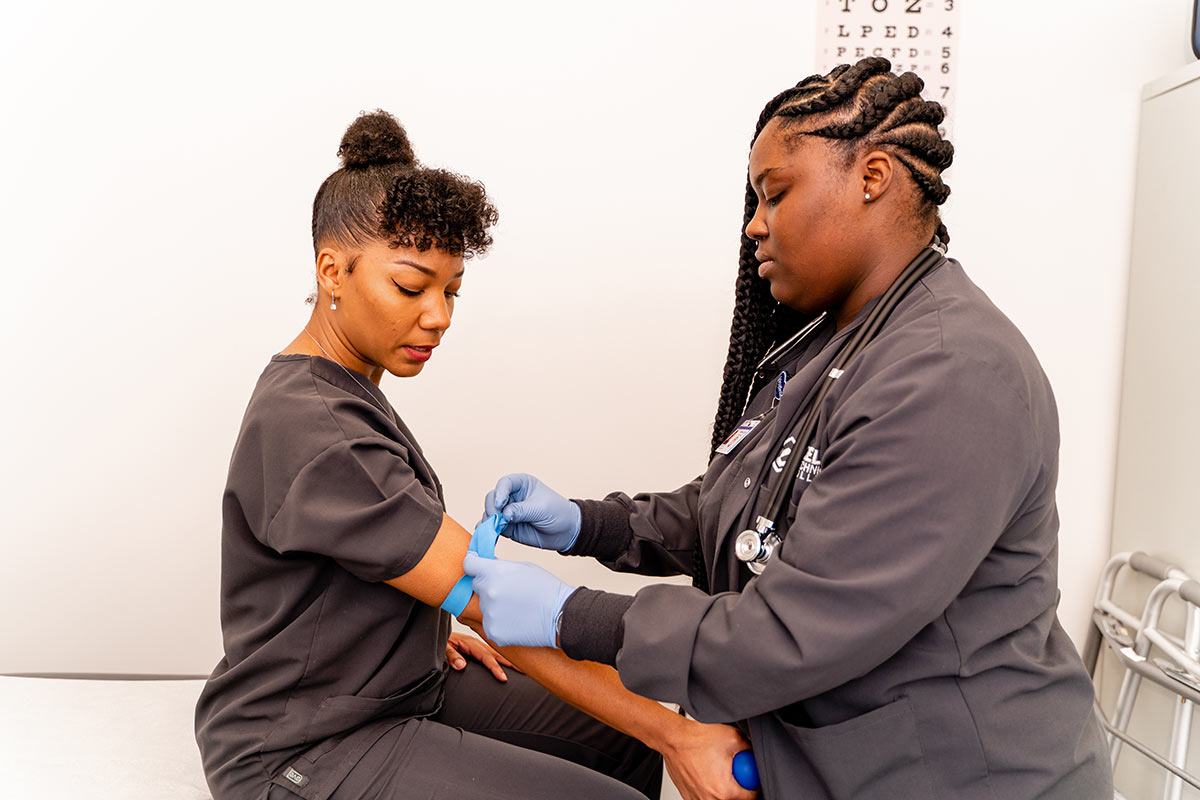Phlebotomy Courses Near Me: What You’ll Need to Start
Phlebotomy Courses Near Me: What You’ll Need to Start
Blog Article
The Course to Accreditation: Understanding the Phlebotomy Training Program Journey and Its Significance
As you take into consideration the course to qualification in phlebotomy, it's important to recognize the duty you'll play in health care. Your training will certainly cover important skills, from blood collection strategies to patient communication.

The Duty of Phlebotomists in Medical Care
Phlebotomists play a vital duty in the healthcare system, acting as the vital link between clients and vital analysis testing. You'll carry out blood draws, making sure samples are collected accurately and safely. Your know-how helps in detecting medical problems, monitoring health, and assisting therapy choices.
In your day-to-day interactions, you'll require to develop count on with individuals, making them feel comfortable throughout what may be a difficult experience. You're responsible for identifying and taking care of samples very carefully to stop contamination or mistakes, which could impact examination results.
Beyond this, you'll commonly work together with physicians and nurses, connecting important details concerning patients' conditions. Your function is fundamental in maintaining the process in health care settings, making certain timely and exact results. By grasping your skills, you contribute meaningfully to individual care, making you a vital component of the medical team. Embracing this responsibility is essential to your success as a phlebotomist.
Review of Phlebotomy Training Programs
When exploring phlebotomy training programs, you'll find numerous types designed to fit different timetables and finding out designs. Each program assists you create essential skills like blood collection and individual communication. Comprehending these choices is key to choosing the appropriate course for your job.
Sorts Of Training Programs
Numerous sorts of training programs are offered for those aiming to end up being efficient in phlebotomy. You can pick from certification programs, which generally last a few months and concentrate on necessary skills. There are also diploma programs that supply an even more complete education and learning, frequently lasting approximately a year. If you're seeking a much deeper understanding, an associate degree in an associated field may be the best fit. On the internet courses offer adaptability for those stabilizing job or family members commitments, enabling you to study at your own speed. Furthermore, some healthcare facilities and centers supply on-the-job training programs, providing useful experience while you find out. Whatever course you pick, each program aims to outfit you with the necessary abilities for an effective phlebotomy career.

Key Abilities Developed
Mastering phlebotomy requires a collection of crucial skills that are established via extensive training programs. In addition, communication abilities are basic; you'll need to engage with people, explain procedures, and placed them at simplicity. Each of these abilities is necessary for your success as a qualified phlebotomist, making you an important property in any type of medical care setup.
Secret Components of a Phlebotomy Training Course
In a phlebotomy course, you'll concentrate on necessary topics that prepared for your future career. You'll take part in hands-on training that permits you to use what you have actually found out in real-world settings. Both the core educational program and functional experience are crucial for your success as a phlebotomist.
Core Educational Program Introduction
While pursuing a phlebotomy training program, you'll run into a core educational program developed to equip you with essential skills and knowledge. Phlebotomy Classes Near Me. This curriculum commonly includes composition and physiology, concentrating on the blood circulation system and recognizing blood components. You'll additionally discover various types of blood collection methods, including venipuncture and capillary leak strategies
In addition, infection control and safety and security protocols are necessary elements, ensuring you understand how to keep a sterile atmosphere. You'll study patient communication, stressing interaction and compassion, which are vital for easing patient anxiousness. Moral and legal considerations will certainly be attended to, preparing you for real-world responsibilities. This fundamental expertise will certainly allow you to succeed as a phlebotomist and supply top quality treatment in scientific settings.
Hands-On Training Experience
Getting hands-on experience is a vital component of your phlebotomy training course. This useful training enables you to apply what you have actually found out in a real-world setting, enhancing your abilities and confidence. Phlebotomy Classes Near Me.
Furthermore, you'll obtain the possibility to communicate with clients, which is necessary for establishing your communication abilities. This combination of technical proficiency and social skills is critical for your success as a certified phlebotomist. Ultimately, hands-on training is where theory meets method, strengthening your knowledge and preparedness for certification.
Accreditation and Licensing Needs
Prior to you can begin your profession in phlebotomy, it is important to comprehend the accreditation and licensing needs that vary by state. Many states require phlebotomists to hold an accreditation from an acknowledged company, such as the National Phlebotomy Organization or the American Society for Clinical Pathology. These accreditations generally involve passing an examination that tests your understanding and skills in the field.
Along with qualification, some states have specific licensing demands. You might need to complete a certain number of hours in scientific technique, send proof of training, or go through a history check. It is necessary to investigate your state's policies to see to it you meet all required standards.
Staying educated concerning these requirements not just assists you secure a position but likewise boosts your credibility as an expert. By fulfilling these demands, you'll be well on your means to a successful job in phlebotomy.
Hands-On Training and Practical Experience
Hands-on training and functional experience are vital parts of your phlebotomy education and learning, as they permit you to use academic expertise in real-world situations. Throughout your training, you'll participate in visit this website supervised venipuncture, find out appropriate techniques, and come to be accustomed to numerous blood collection tools. This straight involvement is go to my site essential for building your self-confidence and honing your abilities.
You'll function carefully with seasoned professionals that can direct you with the nuances of patient interaction and sample handling. Each technique session not only reinforces your understanding however additionally prepares you for the busy setting of medical care setups.
Additionally, lots of programs incorporate clinical rotations, enabling you to experience varied setups, from health centers to outpatient facilities. This direct exposure helps you adjust to different difficulties and person needs, ensuring you're well-prepared for your future role. Accept these chances, as they're necessary to coming to be a skilled and thoughtful phlebotomist.
Obstacles Encountered Throughout Training
While obtaining hands-on experience is important, it's vital to identify the obstacles that can emerge throughout your phlebotomy training. In addition, grasping the abilities needed for blood draws takes practice; you may have a hard time with technique at first.
Time management can also be an obstacle, as harmonizing theory, functional sessions, and individual commitments can feel daunting. You may deal with differing learning speeds amongst your peers, bring about feelings of insecurity if you assume you're falling back. Ultimately, adapting to the different individualities of instructors can be difficult, as find out this here each may have an one-of-a-kind mentor design.
Identifying these challenges early on can prepare you for success and help you establish resilience throughout your training trip.
Occupation Opportunities After Certification

As you gain experience, you may even consider focusing on areas like pediatric or senior citizen phlebotomy, accommodating particular client requirements. Some phlebotomists choose to progress their professions by ending up being research laboratory professionals or going after additional education and learning in healthcare fields.
Additionally, your qualification can result in functions in training or monitoring new phlebotomists, allowing you to share your expertise. With the healthcare industry continuously expanding, your skills will certainly constantly remain in need, leading the means for a steady and meeting occupation. Accept the chances waiting on you!
Often Asked Concerns
What Is the Typical Period of a Phlebotomy Training Program?
Phlebotomy training courses usually last around 4 to 8 weeks. You'll take part in hands-on practice, class instruction, and on-line discovering. Finishing this training prepares you for certification and a gratifying career in medical care.
Are Online Phlebotomy Courses Available?
Yes, online phlebotomy training courses are readily available. They supply flexibility and comfort, enabling you to examine at your very own rate. Simply validate the program is recognized to satisfy qualification needs and gain useful skills for your profession.
Just How Much Does Phlebotomy Training Commonly Cost?
Phlebotomy training typically costs between $700 and $2,500, depending upon the program and place. You need to think about elements like course size, included products, and hands-on experience when selecting the best training for you.
What Prevail Requirements for Phlebotomy Training?
Common requirements for phlebotomy training often consist of a secondary school diploma or GED, immunizations, and a history check. Some programs may also need basic medical care expertise or certifications, guaranteeing you're planned for hands-on training.
Can I Function While Finishing My Phlebotomy Training?
Yes, you can work while completing your phlebotomy training. Numerous trainees balance jobs with their research studies, yet make sure to manage your time efficiently to assure you meet both job and training commitments efficiently.
Report this page